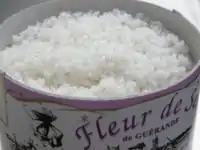sāls
Latvian

Etymology
From Proto-Baltic *sal-, *sāl-, from Proto-Balto-Slavic *sāˀlis, from Proto-Indo-European *sal-, *seh₂l- (“salt, sea salt”), perhaps related to the homophonous stem *sal- (“grayish, impure gray”).
In Latvian, both an i-stem (*salis) and an iyo-stem (*saliyos > *saliys > *salis) were formed, yielding present-day sāls, feminine, genitive sāls, and sāls, masculine, genitive sāļa. Cognates include Lithuanian sólymas (“salt water, brine”) (< *solis), Old Prussian sal, Old Church Slavonic соль (solĭ), Russian соль (solʹ), Ukrainian сіль (silʹ), genitive соли (soly), Bulgarian сол (sol), Czech sůl, Polish sól, Proto-Germanic *sald- (Gothic 𐍃𐌰𐌻𐍄 (salt), Old High German salz, German Salz, English salt), Old Irish salann, Ancient Greek ἅλς (háls), genitive ἁλός (halós), Latin sāl, genitive sālis, Sanskrit सलिल (salilá, “salty”).[1]
Pronunciation
- IPA(key): [sàːls]
Noun
sāls f or m (6th or 2nd declension, irregular nominative, genitive)
- salt (white crystalline substance — sodium chloride or NaCl — used for seasoning food)
- vārāmais sāls ― common (lit. cooking) salt
- ēdieniem par maz sāls ― the food has too little salt
- (chemistry) salt (result of a chemical reaction between an acid and a base)
- fosforskābes sāls ― phosphoric acid salt
- sērskābes saļi jeb sulfāti ― sulfuric acid salts, also known as sulphates
Usage notes
Although officially a feminine sixth-declension noun in standard Latvian, sāls is often used in colloquial Latvian as a masculine second-declension noun.
Declension
| singular (vienskaitlis) | plural (daudzskaitlis) | |
|---|---|---|
| nominative (nominatīvs) | sāls | sālis |
| accusative (akuzatīvs) | sāli | sālis |
| genitive (ģenitīvs) | sāls | sāļu |
| dative (datīvs) | sālij | sālīm |
| instrumental (instrumentālis) | sāli | sālīm |
| locative (lokatīvs) | sālī | sālīs |
| vocative (vokatīvs) | sāls | sālis |
| singular (vienskaitlis) | plural (daudzskaitlis) | |
|---|---|---|
| nominative (nominatīvs) | sāls | sāļi |
| accusative (akuzatīvs) | sāli | sāļus |
| genitive (ģenitīvs) | sāļa | sāļu |
| dative (datīvs) | sālim | sāļiem |
| instrumental (instrumentālis) | sāli | sāļiem |
| locative (lokatīvs) | sālī | sāļos |
| vocative (vokatīvs) | sāli | sāļi |
Related terms
- sālīt
- sāļš
- sāļums
References
- Karulis, Konstantīns (1992), “sāls”, in Latviešu Etimoloģijas Vārdnīca (in Latvian), Rīga: AVOTS, →ISBN